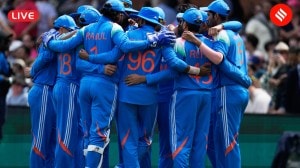Stay updated with the latest - Click here to follow us on Instagram
2002 Ghatkopar bus blast: One of 10 absconding accused held
In 2005, a special court in Mumbai had acquitted all eight persons tried as accused in the case, including Mohammed Altaf, who, in his confession, named Qureshi. Qureshi, a native of Aurangabad, was apprehended by a team of Gujarat Anti-Terrorism Squad on May 5.
 Irfan Ahmed Qureshi was apprehended by a team of Gujarat Anti-Terrorism Squad on May 5
Irfan Ahmed Qureshi was apprehended by a team of Gujarat Anti-Terrorism Squad on May 5
Over 15 years after a bomb blast in a BEST bus killed two at Ghatkopar in 2002, the Mumbai police on Monday arrested Irfan Ahmed Qureshi, one of the 10 absconding accused in the case. In 2005, a special court in Mumbai had acquitted all eight persons tried as accused in the case, including Mohammed Altaf, who, in his confession, named Qureshi.
Qureshi, a native of Aurangabad, was apprehended by a team of Gujarat Anti-Terrorism Squad on May 5. His transit remand was taken for his appearance before a Mumbai court till May 7.
On Monday, chief public prosecutor Lata Chheda submitted before the court that 47-year-old Qureshi’s custody was needed to probe further into his role in the blast. The remand application submitted by the police before the court stated that the police wanted to question him on the whereabouts of the other absconding accused, his involvement in other terror activities since 2002 and whether he is connected to any terror group.
Advocates Tahira Shaikh and Yakub Shaikh representing Qureshi submitted that all the accused in the case had been acquitted, based on the evidence submitted by the Mumbai police, on which it was now relying to seek his custody. They further submitted that Qureshi’s name was included in the list of accused on the basis of the confession of Altaf, who had told the court designated under the now repealed Prevention of Terrorist Activities (POTA) Act, that the confession was taken under force by the police.
Based on the confession, the police had claimed that Qureshi was a partner of Pragma Software, a front allegedly set up by the accused to influence Muslim youths into terror activities, while they worked for the banned organisation Students Islamic Movement of India.
Countering this, Qureshi’s defence advocates referred to a report by the Review Committee of POTA Act, where his family members had challenged him being named as an accused under the POTA Act. The report had claimed that Qureshi was a partner in the firm only for nine months and that he had left for the job of a lecturer in Muscat in October 2002, and that he was not in the country at the time of the blast on December 2, 2002 nor was associated with the firm, when it was raided by the police.
The committee had stated in 2004 that it could not be said a prima facie case was made out to indicate any connection between Qureshi and the offence. “However, further investigation of the case, including interrogation of Irfan Ahmed Qureshi, if necessary, is not foreclosed,” the committee had said on March 6, 2004.
Qureshi’s advocates submitted before the court that despite his multiple trips to India from Muscat, the police had so far not called him even once for questioning. The police claimed that he was not traceable all these years and hence his interrogation was necessary. The court granted the police his custody till May 14, observing that police should be given an opportunity to probe the accused’s involvement in the case.
In 2005, while eight accused were acquitted, nine others were discharged for the lack of evidence. One of the men arrested from Parbhani, Khwaja Yunus, was allegedly killed in custody following police torture. The trial in the case is currently under way.
The blast outside Ghatkopar station had killed two, while injuring 49.







